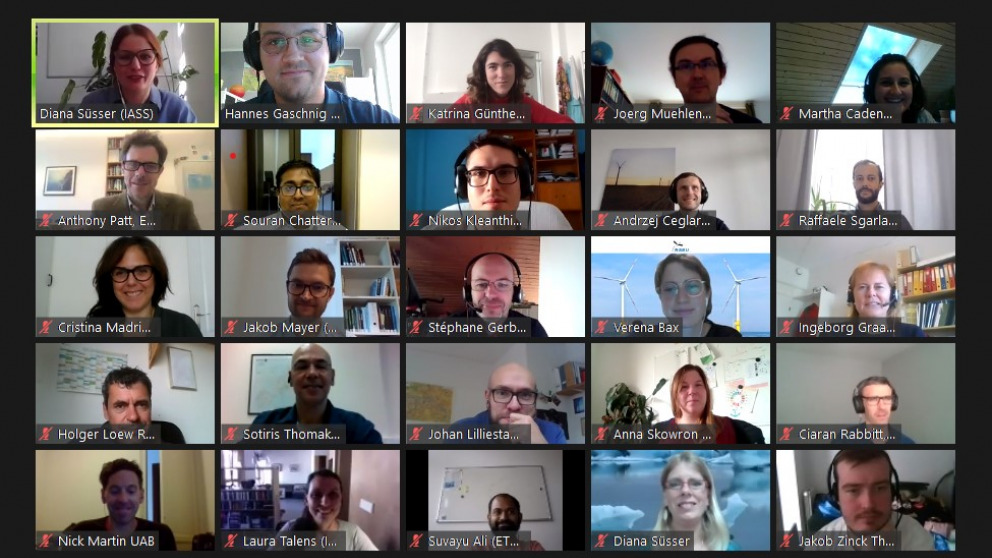What do the Corona restrictions mean for researching with stakeholders in energy and marine research?
19.08.2021

By Diana Süsser (IASS) and Vera Köpsel (Universität Hamburg)
In spring 2020, we asked ourselves: What effects are the Corona restrictions having on projects in energy and marine research that actively include interest groups (or stakeholders) in their research?
After our time together at Universität Hamburg, Vera Köpsel has dedicated herself to fisheries research, while Diana Süsser has delved deeper into research for a sustainable energy transition. What unites our work is that we both actively collaborate with stakeholders from politics, business, civil society and research. We had planned a variety of activities for 2020 with precisely these stakeholders. The Corona crisis, however, left us with many question marks concerning their implementation. We were sure that we were not alone. Globally, the pandemic and restrictions related to it have made life more difficult. This, we thought, would inevitably have had consequences for our research with stakeholders.
For this reason, we decided to conduct a joint survey to take a closer look at the impact of the Corona measures on research activities. Our central research questions were: What effects are contact restrictions and lockdowns having on research that includes stakeholder engagement? What measures have researchers taken? And how do researchers evaluate alternative stakeholder activities?
In summer 2020, we distributed the survey to European research projects in energy and marine science. We received a total of 84 responses from researchers in energy research and 24 from marine research.
Five core messages emerged from the survey:
- Corona measures are having a predominantly negative impact on research with stakeholders.
- Researchers have overwhelmingly switched to alternative online formats.
- “One-to-one” online formats work best.
- The progress of many research projects is being slowed by these changes, and some are even having to be extended.
- Online formats will continue to complement, but not replace physical events.
Corona measures have had a predominantly negative impact on research with stakeholders.
For most researchers, the Corona crisis negatively affected stakeholder engagement in research. Not surprisingly, it became more difficult to reach different stakeholders. They had less time, and the priority for their participation in research projects decreased. In energy research, on average only one out of every six planned activities could take place. However, it was also shown that for some researchers it became easier to reach stakeholders online than it was to arrange face-to-face meetings. This could be because stakeholders were more accessible at home due to the elimination of business trips, and because it took them less time to attend an online meeting.
Researchers have overwhelmingly switched to alternative online formats
Social distancing meant that nearly all research activities took place online. Most face-to-face events were either cancelled or postponed; occasionally, the format was changed. Researchers primarily chose webinars and online workshops as alternative, digital formats. However, projects that were originally planned online could usually be held according to plan.
“One-to-one” online formats work best
Researchers indicated that online formats work best where there is one-to-one exchange, or where unidirectional information provision takes place. Online interviews and surveys were rated most positively while virtual stakeholder engagement was much more difficult in more interactive formats. This is mainly because interactive exchange online is difficult, requires much more preparation time, and costs energy. Digital events were therefore often shorter in order not to overwhelm participants and organisers. For this reason, fewer far-reaching and meaningful results could be achieved.
Research project extension?
The workflow of many projects was disrupted by the Corona crisis. Six months after the COVID-19 pandemic began, more than 80% of marine researchers and more than half of energy researchers saw the workflow and results of their research project negatively affected. Delays in research projects also led to more than a third and around a quarter of researchers in energy and marine sciences, respectively, stating that they saw the need for a project extension. Some of the projects indicated that they have already entered into negotiations with the European Commission. However, it remains to be seen whether and for how long projects will need to be extended. Our research project SENTINEL (energy research) is seeking an extension of about half a year.
Online formats will continue to complement but not replace physical events
There is a strong consensus among researchers that online activities will continue to be used to involve stakeholders in research projects after the Corona crisis. When it comes to bilateral information transfer or exchange, digital formats are particularly suitable. Having said that, there is also a consensus that online formats will mainly complement, not replace physical events. One reason for this is that not all stakeholders can participate in online events, which may exclude certain groups. Transdisciplinary research that seeks to co-create with stakeholders will therefore not be able to do without physical meetings in the future.
Our research has shown that the digital engagement of stakeholders in research has become a new norm. There are opportunities to engage stakeholders more regularly and with lower travel and event costs. However, inclusive, far-reaching collaboration between researchers and practice partners still requires physical interaction between people. By the end of the Corona crisis, we will certainly all appreciate once again being able to meet in person and conduct applied, relevant research together − with exchanges both during the actual workshops and informally during the coffee breaks, the importance of which should not be underestimated.
This research was carried out as part of the EU H2020 projects SENTINEL and PANDORA. A scientific article on the results from marine research appeared in Maritime Studies and from energy research in Open Research Europe.
If you want to learn more about our research, feel invited to join the IASS Tuesday Talk on the 24th of August, at 14:00. You can register here.